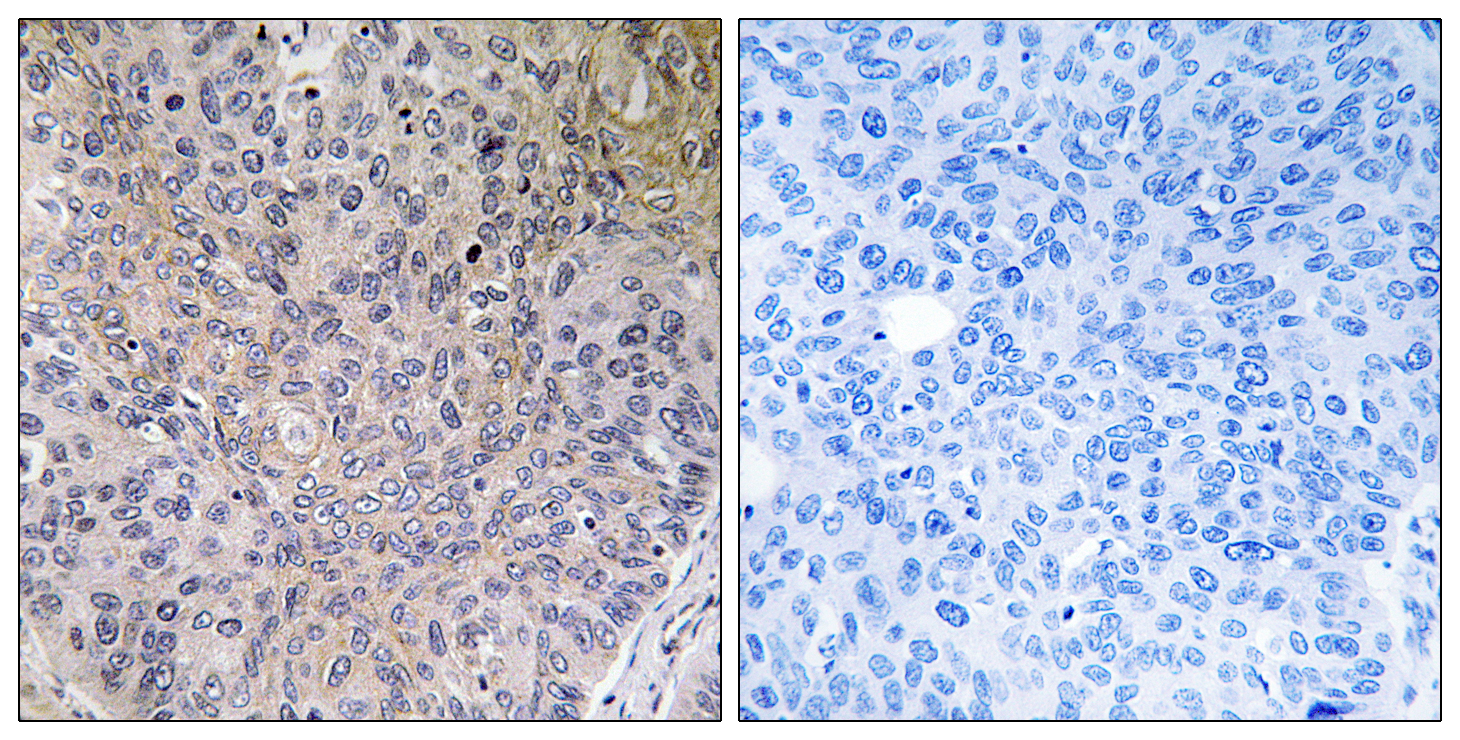NDUFS7 Polyclonal Antibody
- Catalog No.:YT3021
- Applications:IHC;IF;ELISA
- Reactivity:Human;Mouse;Rat
- Target:
- NDUFS7
- Fields:
- >>Oxidative phosphorylation;>>Metabolic pathways;>>Thermogenesis;>>Retrograde endocannabinoid signaling;>>Non-alcoholic fatty liver disease;>>Alzheimer disease;>>Parkinson disease;>>Amyotrophic lateral sclerosis;>>Huntington disease;>>Prion disease;>>Pathways of neurodegeneration - multiple diseases;>>Chemical carcinogenesis - reactive oxygen species;>>Diabetic cardiomyopathy
- Gene Name:
- NDUFS7
- Protein Name:
- NADH dehydrogenase [ubiquinone] iron-sulfur protein 7 mitochondrial
- Human Gene Id:
- 374291
- Human Swiss Prot No:
- O75251
- Mouse Gene Id:
- 75406
- Mouse Swiss Prot No:
- Q9DC70
- Immunogen:
- The antiserum was produced against synthesized peptide derived from human NDUFS7. AA range:164-213
- Specificity:
- NDUFS7 Polyclonal Antibody detects endogenous levels of NDUFS7 protein.
- Formulation:
- Liquid in PBS containing 50% glycerol, 0.5% BSA and 0.02% sodium azide.
- Source:
- Polyclonal, Rabbit,IgG
- Dilution:
- IHC 1:100 - 1:300. ELISA: 1:40000.. IF 1:50-200
- Purification:
- The antibody was affinity-purified from rabbit antiserum by affinity-chromatography using epitope-specific immunogen.
- Concentration:
- 1 mg/ml
- Storage Stability:
- -15°C to -25°C/1 year(Do not lower than -25°C)
- Other Name:
- NDUFS7;NADH dehydrogenase [ubiquinone] iron-sulfur protein 7; mitochondrial;Complex I-20kD;CI-20kD;NADH-ubiquinone oxidoreductase 20 kDa subunit;PSST subunit
- Molecular Weight(Da):
- 24kD
- Background:
- This gene encodes a protein that is a subunit of one of the complexes that forms the mitochondrial respiratory chain. This protein is one of over 40 subunits found in complex I, the nicotinamide adenine dinucleotide (NADH):ubiquinone oxidoreductase. This complex functions in the transfer of electrons from NADH to the respiratory chain, and ubiquinone is believed to be the immediate electron acceptor for the enzyme. Mutations in this gene cause Leigh syndrome due to mitochondrial complex I deficiency, a severe neurological disorder that results in bilaterally symmetrical necrotic lesions in subcortical brain regions. [provided by RefSeq, Jul 2008],
- Function:
- catalytic activity:NADH + acceptor = NAD(+) + reduced acceptor.,catalytic activity:NADH + ubiquinone = NAD(+) + ubiquinol.,cofactor:Binds 1 4Fe-4S cluster .,disease:Defects in NDUFS7 are a cause of complex I mitochondrial respiratory chain deficiency [MIM:252010]. Complex I (NADH-ubiquinone oxidoreductase), the largest complex of the mitochondrial respiratory chain, contains more than 40 subunits. It is embedded in the inner mitochondrial membrane and is partly protruding in the matrix. Complex I deficiency is the most common cause of mitochondrial disorders. It represents largely one-third of all cases of respiratory chain deficiency and is responsible for a variety of clinical symptoms, ranging from neurological disorders to cardiomyopathy, liver failure, and myopathy.,disease:Defects in NDUFS7 are a cause of Leigh syndrome (LS) [MIM:256000]. LS is a severe neurological disorder charac
- Subcellular Location:
- Mitochondrion inner membrane ; Peripheral membrane protein ; Matrix side .
- Expression:
- Brain,Dermoid cancer,Uterus,
- June 19-2018
- WESTERN IMMUNOBLOTTING PROTOCOL
- June 19-2018
- IMMUNOHISTOCHEMISTRY-PARAFFIN PROTOCOL
- June 19-2018
- IMMUNOFLUORESCENCE PROTOCOL
- September 08-2020
- FLOW-CYTOMEYRT-PROTOCOL
- May 20-2022
- Cell-Based ELISA│解您多样本WB检测之困扰
- July 13-2018
- CELL-BASED-ELISA-PROTOCOL-FOR-ACETYL-PROTEIN
- July 13-2018
- CELL-BASED-ELISA-PROTOCOL-FOR-PHOSPHO-PROTEIN
- July 13-2018
- Antibody-FAQs
- Products Images

- Immunohistochemistry analysis of paraffin-embedded human lung carcinoma tissue, using NDUFS7 Antibody. The picture on the right is blocked with the synthesized peptide.



